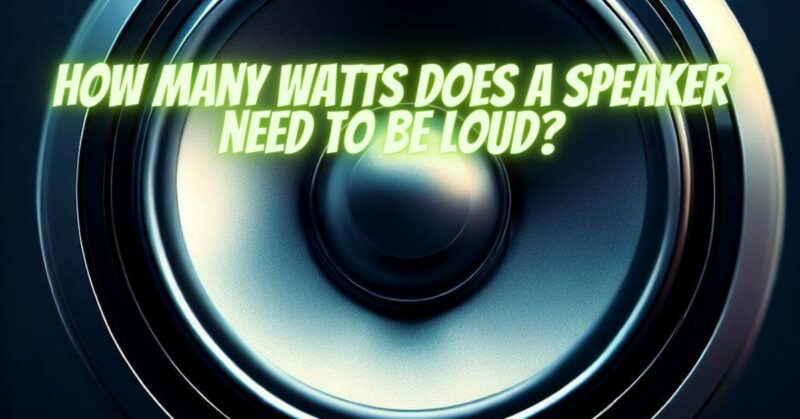The question of how many watts a speaker needs to be loud is a common concern for those looking to purchase speakers for various applications. The loudness of a speaker is determined by several factors, with wattage being just one of them. In this article, we will explore the relationship between watts and loudness, understanding the power requirements for different speaker applications, and the factors that contribute to a speaker’s overall volume capabilities.
Wattage and Loudness:
The wattage of a speaker, often referred to as its power rating, indicates the maximum amount of electrical power the speaker can handle. While higher wattage speakers can generally produce louder sound, the loudness of a speaker is not solely determined by its wattage rating. Speaker efficiency, sensitivity, and the quality of the speaker components also play crucial roles in determining the overall volume capabilities.
Speaker Efficiency and Sensitivity:
Speaker efficiency refers to how effectively the speaker converts electrical power into sound. High-efficiency speakers can produce more sound output using less power, making them inherently louder than low-efficiency speakers with the same wattage rating. Sensitivity, measured in decibels (dB), indicates how loud a speaker can be at a specific distance with a set amount of power. Speakers with higher sensitivity ratings require less power to achieve the same loudness as speakers with lower sensitivity ratings.
Matching Wattage to Application:
The required wattage for a speaker to be considered loud depends on the intended application. Here are some common scenarios:
- Home Audio: For most home audio setups, speakers with moderate wattage and high sensitivity are sufficient for providing loud and clear sound, even at lower volume levels.
- Studio Monitors: Studio monitors are designed for accuracy and detailed sound reproduction, and they generally have lower wattage ratings. Higher wattage is not necessary for studio applications.
- Live Performances: In live performance settings, higher wattage speakers are often necessary to ensure enough volume to reach the audience without distorting the sound.
- Outdoor Events: For outdoor events or large gatherings, speakers with higher wattage and high sensitivity are essential to provide adequate sound coverage.
Speaker Overloading:
It is crucial to avoid underpowering or overpowering speakers. Underpowering can cause clipping, distortion, and potential damage to the speakers. On the other hand, overpowering can lead to blown speakers or excessive strain on the speaker components. Matching the speaker’s wattage requirements to the amplifier’s output is essential for achieving optimal sound quality and protecting the speakers from damage.
The loudness of a speaker is not solely determined by its wattage rating. Speaker efficiency, sensitivity, and other factors also play critical roles in determining a speaker’s overall volume capabilities. For different applications, the required wattage varies. In general, high-efficiency and high-sensitivity speakers can produce loud sound even with lower wattage, while lower efficiency speakers may require higher wattage to achieve the same loudness. When choosing speakers, consider the intended application, the size of the venue, and the desired volume levels. Properly matching the amplifier’s output to the speaker’s wattage requirements ensures optimal sound performance and a satisfying listening experience.


